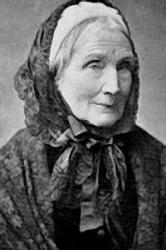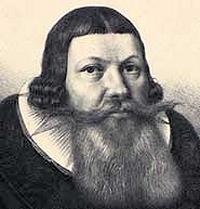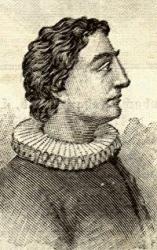Planning worship?
Check out our sister site, ZeteoSearch.org,
for 20+ additional resources related to your search.
- |
User Links
Person Results
Christian Pressovius
Person Name: C. Pressovius Author of "O Mensch, der Himmel ist zu fern" in Gesangbuch mit Noten
Christian Pressovius
Leenaerdt Clock
Person Name: Leonard Clock Author of "O God, Father, Thee Do We Bless" in The Christian Hymnary. Bks. 1-4
Leenaerdt Clock
Mary Botham Howitt

1799 - 1888 Person Name: Mary Howitt, c. 1804-1888 Author of "Thou, earth, art ours" in The Beacon Song and Service book Howitt, Mary, née Botham, second daughter of Samuel Botham, a member of the Society of Friends, was born at Uttoxeter, Staffordshire, circa 1804, was married in 1823 to William Howitt, and died Jan. 30, 1888. Her publications have little in common with hymnody. They include poems, novels, translations of Swedish and Spanish works, and numerous contributions to magazines. In addition she was joint author with her husband of Literature and Romance of Northern Europe, 1852, &c. Her hymns include:—
1. God might have made the earth bring forth. The Use of Flowers. From her Birds and Flowers, and Other Country Things, Lond., N. D. (Preface, Sept. 28, 1837), p. 122, in 8 stanzas of 4 lines.
2. How goodly is the earth. Flower Services. From her Hymns and Fireside Verses, Lond., 1839, p. 167.
3. 0 spirit, freed from earth. Death and Burial. Altered from her poem, "The Ascent of the Spirit," in her Ballads and Other Poems, 1847, p. 318. Dr. Martineau dates this poem 1834.
Mrs. Howitt also contributed " Let me suffer, let me drain" (The Willing Disciple), and " Clothe me with Thy saving grace " (The Cry of the spirit) to Lyra Britannica, 1867.
-- John Julian, Dictionary of Hymnology
=============================
Howitt, Mary, p. 541, i. Her hymn “Let me suffer; let me drain," is the opening hymn of the Lays of the Sanctuary, 1859. She died Jan. 30, 1888.
--John Julian, Dictionary of Hymnology, Appendix, Part II (1907)
Mary Botham Howitt
Andreas Knoepken
1490 - 1539 Person Name: A. Knøpken Author of "Hvad kan os komme til for Nød" in M. B. Landstads Kirkesalmebog og "Nokre Salmar" ved Professor Dr. E. Blix, samt følgende tillæg Knöpken, Andreas (Cnophius), was born at Kustrin (Custrin) about 1490. He was for some time assistant in the school at Treptow, in East Pomerania, under Bugenhagen. But as they both espoused the cause of the Reformation, they had to flee from Treptow in 1521, Bugenhagen to Wittenberg, and Knopken to Riga. At Riga Knöpken conducted a successful disputation with the monks, and was appointed by tbe Council and burgesses evangelical archidiaconus of St. Peter's Church, where he began his work Oct. 23, 1522. He died at Riga, Feb. 18, 1539.
Knöpken's hymns are almost all Psalm versions. Three appeared under the title of Ethlike psalmen dorch Andream Knöpken vordütscht as an Appendix to B. Waldis's De parabell vam vorlorn Szohn, Riga, 1527. The rest appeared in the Riga Kirchenordnung, 1530, 1537, &c. See the introduction to Dr. J. Geffcken's reprint (Hannover, 1862) of the various eds. of this Kirchenordnung.
Knöpken's hymns translated into English are:—
i. Hilff Gott, wie geht das immer zu. Ps. ii. 1527, as above, and thence in Wackernagel, iii. pp. 99-103, in 8 stanzas of 7 lines, beginning “Help Godt, wo geyt dat yûmer to." The High German form is in the Zwickau Enchiridion, 1628. Translated as "Quhat is the caus, O God omnipotent" in the Gude and Godlie Ballates, 1568, f. 44 (1868, p. 74).
ii. Yon alien Menschen abgewandt. Ps. xxv. 1527, as above, and thence in Wackernagel, iii. pp. 105-109, in 12 stanzas of 7 lines, beginning "Van alien Mynschen afgewandt." In High German in V. Schumann's Gesang-Buch Leipzig, 1539. Translated as "I lyft my soule, Lorde, up to the, My God," by Bp. Coverdale, 1539 (Remains, 1846, p. 578).
A hymn frequently, but erroneously, ascribed to Knöpken is noted under Cruciger, E. (p. 271 i.). [Rev. James Mearns, M.A.]
--John Julian, Dictionary of Hymnology (1907)
Andreas Knoepken
E. Gustav Johnson
1893 - 1974 Translator of "O Savior, Thou who for us died" in The Hymnal of the Evangelical Mission Covenant Church of America Born: May 21, 1893, Väse Vämland, Sweden.
Died: November 13, 1974, Miami, Florida.
Johnson’s family emigrated to America when he was 10 years old, settling in Hartford, Connecticut. He learned the craft of a printer, but at age 30 took up studies at North Park, Chicago, Illinois, where he earned degrees at the academy, college, and seminary. He went on to graduate from the University of Chicago and Duke University. He started teaching English and Swedish at North Park in 1931, staying there three decades. He also found time to edit the Swedish Pioneer Historical Quarterly. His works include:
The Swedish Element in America, 1933 (co-editor)
Translation of C. J. Nyvall’s Travel Memories from America, 1876
Translation of Erik Wallgren’s A Swedish-American Preacher’s Story
--www.hymntime.com/tch/
================
E. Gustav Johnson (1925)
The first literal English translation of "O store Gud" was by E. Gustav Johnson (1893–1974), then a professor of North Park College, Illinois. His translation of verses 1, 2, and 7-9 was published in the United States in the Covenant Hymnal as "O Mighty God" in 1925.
The first three Covenant hymnals in English used Johnson's translation, with The Covenant Hymnal(1973) including all nine verses of Boberg’s original poem. There was a desire to replace Johnson's version with the more popular version of British missionary Stuart K. Hine's “How Great Thou Art”. Wiberg explains:
Given the popularity of Stuart Hine’s translation of "How Great Thou Art" in the late 60s and early 70s, the Hymnal Commission struggled with whether to go with the more popular version or retain E. Gust’s translation. However, economics settled the issue inasmuch as we were unable to pay the exorbitant price requested by the publishing house that owned the copyright despite the fact that the original belonged to the Covenant.
--en.wikipedia.org/wiki/How_Great_Thou_Art
E. Gustav Johnson
M. Guenther
Person Name: M. Günther Author of "Herr Gott, du bist von Ewigkeit" in Evangelisches Gesangbuch mit vierstimmigen Melodien
M. Guenther
Anders Christensen Arrebo

1587 - 1637 Person Name: A. C. Arrebo, 1587-1637 Author of "The Lord My Faithful Shepherd Is" in Evangelical Lutheran Hymnary
Anders Christensen Arrebo
William M. Reynolds
1812 - 1876 Person Name: Wm. Reynolds Translator of "O God! look down from heav'n and see" in Evangelical Lutheran hymnal Born: March 4, 1812, Fayette County, Pennsylvania.
Died: September 5, 1876, Oak Park, Illinois.
Reynolds was educated at Jefferson College, Canonsburg, Pennsylvania, and Lutheran Gettysburg Seminary. He was a professor at Pennsylvania College (1833-50); president of Capital University, Columbus, Ohio (1850-53); and president of Illinois State University (1857-60). He became an ordained Episcopal minister in 1864, and founded the Evangelical Review. His last pastorate was at Christ Church, Harlem (Oak Park), Illinois, from 1872 until his death.
Lyrics--
Come, Thou Savior of Our Race
Come, Thou Soul Transforming Spirit
Eternity, Terrific Word
Jesus, My Lord, Thy Nearness Does Impart
Lord Jesus Christ, to Thee We Pray
O God, Look Down from Heaven, We Pray
O Holy Ghost, Descend We Pray
O Lord, Uphold Us by Thy Word
O Lord, We Would Praise Thee
Rejoice, Ye Ransomed of the Lord
Translations--
"Savior of the Nations, Come"
---www.hymntime.com/tch
William M. Reynolds
Olavus Petri

1493 - 1552 Person Name: Olavus Petri Author of "Thou, Jesus Christ, Didst Man Become" in The Cyber Hymnal Olof Persson, sometimes Petersson (January 6, 1493 – April 19, 1552), better known under the Latin form of his name, Olaus Petri (or less commonly, Olavus Petri), was a clergyman, writer, judge and major contributor to the Protestant Reformation in Sweden.
See also in:
Wikipedia
Olavus Petri
Ernest A. Payne
Translator of "Our Father God, thy name we praise" in Hymnal Ernest A. Payne is General Secretary of the Baptist Union of Great Britain and Ireland with offices in London. He is also active in the Psalms and Hymns Trust which is the publication society of the British Baptists. He was a member of the Editorial Committee for the Baptist Hymn Book of 1962. He was also a member of the committee which prepared The Companion for this hymnal. He is an active member of the Hymn Society of Great Britain and Ireland. His translation of one of the hymns in the Anabaptist Ausbund of the 16th Century appears in the Baptist Hymn Book, entitled "Our Father God, thy name we praise." He is the author of numerous books including the "Free Church Tradition in the Life of England" and the "Fellowship of Believers". He has held many important positions in British church life including service as moderator of the Free Church Federal Council 1958-59. Vice-Chairman, Central Committee, World Council of Churches since 1954.
--Ten New Hymns on the Ministry, 1966. Used by permission.
Ernest A. Payne


 My Starred Hymns
My Starred Hymns


